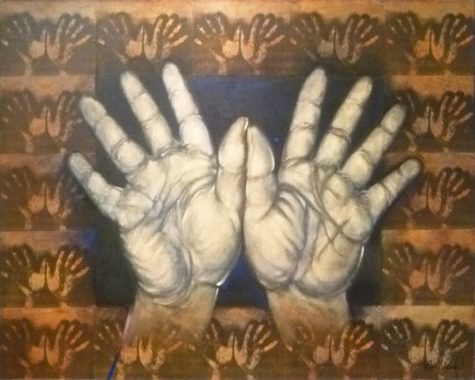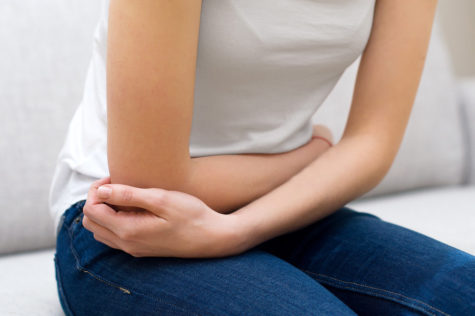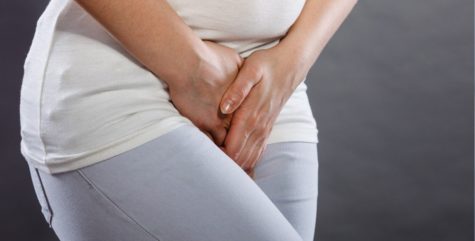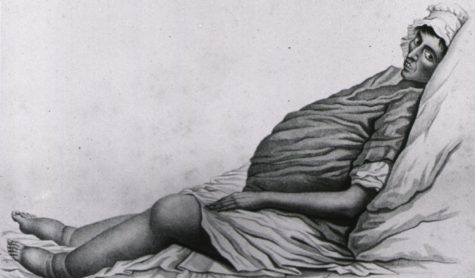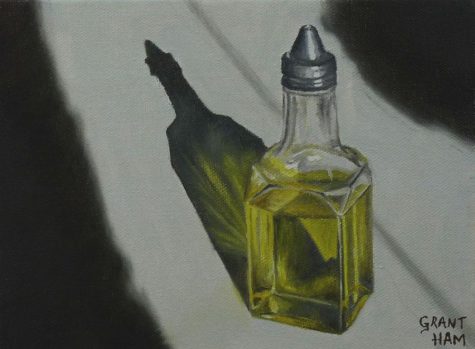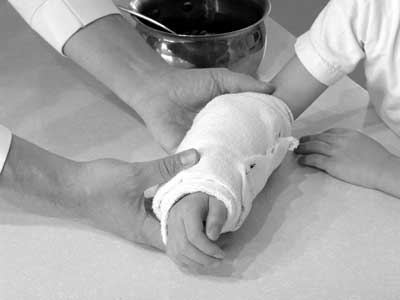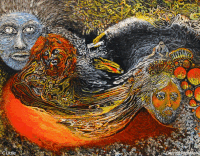Inflammation
Healing With The Fingertips
From Healing and Mental Purification by Hazrat Inayat Khan, we have this instruction for healing with the fingertips:
Hygiene is the first subject to consider in healing with the tips of the fingers. Hands that have been engaged in any work or that are stained with any liquid must be washed for healing. The healer must first observe the hygienic rules of keeping his body, as well as his clothes, pure and clean; especially at the time of healing he must be absolutely free from all that is unhygienic. The sleeves, at the time of healing, must be rolled back, and the fingernails must be clean and properly trimmed.
After healing, one should wave the hand, as it were shaking it, to shake off any fine atoms, or even vibrations, so that a poison taken from the painful part of the patient may not be given to the patient again.
There are cases in which the sensation of the body is deadened by the pain, and the pain has gone into the depth of the affected part of the body. In such cases waving the hand or touching is not enough. Rubbing is necessary.
When dealing with the effects of poison from the sting of a bee or scorpion, or from snake-bite or the bite of any other poisonous animal, a simple soft touch or stroking of the affected part is indicated. If the pain is more intense touch is not necessary, simply the waving of the hand close to the affected part.
In the case of the bite of a mad dog, one should put some lime, mixed with water on a copper coin and tie it on the part that the teeth have touched, and the rest of the affected part must be healed by touching and stroking it with the tips of the fingers.
Bites of mosquitoes and midges may be cured by applying butter, that has been boiled and allowed to cool, and then waving the hand over the affected part.
Rosewater may be used for bites of all kinds, in cases of severe in inflammation.
Nature Cure For Cystitis
The term ‘Cystitis’ refers to ‘inflammation of the bladder’. It is a most common complaint in women. Escherichia coli infections are considered the primary culprit in cystitis. The female anatomy makes it more convenient for e.coli bacteria, which normally inhabit the colon., to travel from the rectum to the vagina, up the urethra and into the bladder.
This condition is rarely dangerous but it is generally a forerunner to more serious troubles. The recurrence of cystitis may in some cases be associated with kidney troubles. The kidney and bladder are the principal strikers in the urinary system. The kidneys are situated on the back of the abdomen, one on each side of the spine at about the level of the lowest rib. The bladder is situated in the lower abdomen, in the pelvis. The body is relieved of the greater part of the waste matter, resulting from the complex working of the whole body’s vital processes by means of these two organs.
Symptoms
Cystitis is characterized by symptoms which may cause great discomfort. The patient complains of frequency and burning on urination as well as an almost continual urge to void. There may be a feeling of pain in the pelvis and lower abdomen. The urine may become thick, dark and stingy. It may have an unpleasant smell and may contain blood or pus. The ‘scalding’ sensation on passing urine indicates that the inflammation has spread to the urethra.
Some pain in the lower back may also be felt in certain cases. In an acute stage there may be a rise in body temperature. In the chronic form of cystitis, the symptoms are similar but generally less several and without the rise in temperature. The persistence of the chronic form of the disease indicates a process of deterioration, almost invariably due to wrong treatment of the acute form by suppressive drugs.
Causes
Cystitis may result from infections in other parts adjacent to the bladder such as the kidneys, the urethra, and the vagina. Local irritation and inflammation of the bladder may be caused if urine is retained there for an unduly long time. It may also result from severe constipation. Continual draining of pus and germs from an infected kidney may injure the epithelial lining of the bladder.
Trouble may also arise from the presence of a stone in either bladder or kidney. Childbirth injuries and major surgical procedures within the pelvis may also lower the resistance of the bladder-wall and predispose to the development of the cystitis.
There is also the problem of new brides who sometimes suffer from so-called honeymoon cystitis. The bladder wall may become swollen and ulcerated so that the bladder cannot hold the normal amount of urine. Germs may then find their way into the bladder and bring about chemical changes in the urine. Calcium or lime may thus be deposited in the walls of the bladder, increasing the patient’s discomfort.
Treatment
At the onset of acute cystitis, it is essential to withhold all solid food immediately. If there is fever, the patient should fast either on water or tender coconut water for three or four days. If there is no fever, raw vegetable juices, especially carrot juice diluted with water, should be taken every two or three hours. By so doing the biochemical energy needed for digestion and metabolism of food is diverted to the process of eliminating toxins and promoting healing and repair.
It is advisable to rest and keep warm at this time. Pain can be relieved by immersing the pelvis in hot water or alternatively by applying heat to the abdomen, using a towel wrung out in hot water, covering it with dry towel to retain warmth. Care should be taken to avoid scalding. A little vegetable oil gently rubbed into the skin , will avoid too much reddening. This treatment may be continued for three or four days, by which time the inflammation should have subsided and the temperature returned to normal.
For the next two or three days, only ripe sub-acid fruits may be taken three or four times daily. These fruits may include grapes, pears, peaches, apples, and melon, as available. While the hot compresses are intended to relieve pain, the use of cold water compresses to the abdomen is most valuable, if correctly applied, in relieving pelvic congestion and increasing the activity of the skin. Care should, however, be taken to ensure that compresses do not cause chilling.
After the all-fruit diet, the patient may gradually embark upon a well-balanced diet, consisting of seeds, nuts and grains, vegetables and fruits. The patient should avoid refined carbohydrates and salt, both at table and in cooking. Salt disturbs the balance of electrolytes and tends to raise blood pressure, which is frequently already raised in kidney troubles.
The prescribed dietary should exclude meat, fish and poultry. They produce uric acid. Most cases of food poisoning and infections, which may lead to gastritis and colitis, are also caused by the flesh foods. In case of chronic cystitis, the patient should commence the treatment of strict adherence to the dietary program, designed to cleanse the blood and other tissues and at the same time provide a rich source of natural vitamins and minerals in balanced proportions.
The patient may adopt the following restricted diet for seven to ten days.
- Upon arising : A glass of unsweetened apple juice or carrot juice
- Breakfast : Fresh fruits, selected mainly from apple, pear, grapes, melon, peach and pineapple and a glass of buttermilk, sweetened with a little honey.
- Mid-morning : Tender coconut water.
- Lunch : A salad of raw vegetables such as carrot, beetroot and cabbage, mixed with curd and a tablespoon of honey. This may be followed by a ripe apple.
- Mid-afternoon : One cup of unsweetened grape juice.
- Dinner : A salad of green leafy vegetables and a fresh fruit, preferably a portion of melon sweetened with a teaspoon of honey.
- Before retiring : One glass of mixed raw carrot and beetroot juice.
After the restricted diet, the patient should gradually embark on a well-balanced diet , consisting of seed, nuts and grains, vegetables and fruits. Even after the recovery from the chronic condition, it will be advisable for the individual to live exclusively on vegetables or on tender coconut water or raw vegetable juices for a day or two, every month. The water treatment and other health building methods should , however, be continued to the greatest extent possible, so that the patient may stay cured.
Pow Wow Cures For Dropsy
Dropsy is a disease derived from a cold humidity, which passes through the different limbs to such a degree that it either swells the whole or a portion of them. The usual symptoms and precursors of every case of dropsy are the swelling of the feet and thighs, and then of the face; besides this the change of the natural color of the flesh into a dull white, with great thirst, loss of appetite, costiveness, sweating, throwing up of slimy substances, but little water, laziness, and aversion to exercise.
Physicians know three different kinds of dropsy, which they name:
- 1. Anasarca, when the water penetrates between the skin and the flesh over the whole body, and all the limbs, and even about the face and swells them.
- 2. Ascites, when the belly and thighs swell, while the upper extremities dry up.
- 3. Tympanites, caused rather by wind than water. The belly swells up very hard, the navel is forced out very far, and the other members fall away. The belly becomes so much inflated that knocking against it causes a sound like that of a large drum, and from this circumstance its name is derived.
The chief thing in curing dropsy rests upon three points, namely:
- 1. To reduce the hardness of the swelling which may be in the bowels or other parts.
- 2. To endeavor to scatter the humors.
- 3. To endeavor to pass them off either through the stool or through the water.
The best cure therefore must chiefly consist in this: To avoid as much as possible all drinking, and use only dry victuals; to take moderate exercise, and to sweat and purge the body considerably.
If anyone feels symptoms of dropsy, or while it is yet in its first stages, let him make free use of the sugar of the herb called Fumatory, as this purifies the blood, and the Euphrasy sugar to open the bowels.
A Cure For Dropsy (said to be infallible)
Take a jug of stone or earthenware, and put four quarts of strong, healthy cider into it; take two handfuls of parsley roots and tops, cut it fine; a handful of scraped horse-radish, two tablespoonfuls of bruised mustard-seed, half an ounce of squills, and half an ounce of juniper berries; put all these in the jug, and place it near the fire for 24 hours so as to keep the cider warm, and shake it up often; then strain it through a cloth and keep it for use.
To a grown person give half a wineglassful three times a day, on an empty stomach. But if necessary you may increase the dose, although it must decrease again as soon as the water is carried off, and, as stated before, use dry victuals and exercise gently.
This remedy has cured a great many persons, and among them a woman of 70 years of age, who had the dropsy so badly that she was afraid to get out of bed, for fear her skin might burst, and who it was thought could not live but a few days. She used this remedy according to the directions given, and in less than a week the water had passed off her, the swelling of her stomach fell, and in a few weeks afterward she again enjoyed perfect health.
- Or:
Drink for a few days very strong Bohea tea, and eat the leaves of it. This simple means is said to have carried away the water from some persons in three or four days, and freed them from the swelling, although the disease had reached the highest pitch.
- Or:
Take three spoonfuls of rape-seed, and half an ounce of clean gum myrrh, put these together in a quart of good old wine, and let it stand over night in the room, keeping it well covered. Aged persons are to take two teaspoonfuls of this an hour after supper, and the same before going to bed; younger persons must diminish the quantity according to their age, and continue the use of it as long as necessary.
- Or:
Take young branches of spruce pine, cut them into small pieces, pour water on them and let them boil a while, then pour it into a large tub, take off your clothes, and sit down over it, covering yourself and the tub with a sheet or blanket, to prevent the vapor from escaping. When the water begins to cool let some one put in hot bricks; and when you have thus been sweating for a while, wrap the sheet or blanket close around you and go to bed with it. A repetition of this for several days will free the system from all water.
The following Valuable Recipes, not in the original work of Hoffman, were added by the publisher.
Cure For Dropsy
Make of the broom-corn seed, well powdered and sifted, one drachm. Let it steep twelve hours in a wineglass and a half of good, rich wine, and take it in the morning fasting, having first shaken it so that the whole may be swallowed. Let the patient walk after it, if able, or let him use what exercise he can without fatigue, for an hour and a half; after which let him take two ounces of olive oil, and not eat or drink anything in less than half an hour afterward. Let this be repeated every day, or once in three days, and not oftener, till a cure is effected, and do not let blood, or use any other remedy during the course.
Nothing can be more gentle and safe than the operation of this remedy. If the dropsy is in the body it discharges it by water, without any inconvenience; if it is between the skin and flesh, it causes blisters to rise on the legs, by which it will run off; but this does not happen to more than one in thirty: and in this case no plasters must be used, but apply red-cabbage leaves. It cures dropsy in pregnant women, without injury to the mother or child. It also alleviates asthma, consumption and disorders of the liver.
From: Pow-Wows, or Long Lost Friend, by John George Hoffman, [1820]
Sweet Oil
Sweet oil (another term for olive oil) possesses a great many valuable properties, and it is therefore advisable for every head of a family to have it at all times about the house in order that it may be applied in cases of necessity. Here follow some of its chief virtues:
It is a sure remedy, internally as well as externally, in all cases of inflammation in men and animals.
Internally, it is given to allay the burning in the stomach caused by strong drink or by purging too severely, or by poisonous medicines. Even if pure poison has been swallowed, vomiting may be easily produced by one or two wine-glasses of sweet oil, and thus the poison will be carried off, provided it has not already been too long in the bowels; and after the vomiting, a spoonful of the oil should be taken every hour until the burning caused by the poison is entirely allayed.
Whoever is bitten by a snake, or any other poisonous animal, or by a mad dog, and immediately takes warmed sweet oil, and washes the wound with it, and then puts a rag, three or four times doubled up and well soaked with oil, on the wound every three or four hours, and drinks a couple of spoonfuls of the oil every four hours for some days, will surely find out what peculiar virtues the sweet oil possesses in regard to poisons.
In dysentery, sweet oil is likewise a very useful remedy, when the stomach has first been cleansed with rhubarb or some other suitable purgative, and then a few spoonsfuls of sweet oil should be taken every three hours. For this purpose, however, the sweet oil should have been well boiled and a little hartshorn be mixed with it. This boiled sweet oil is also serviceable in all sorts of bowel complaints and in colics; or when anyone receives internal injury as from a fall, a few spoonfuls of it should be taken every two hours; for it allays the pain, scatters the coagulated blood, prevents all inflammation and heals gently.
Externally, it is applicable in all manner of swellings; it softens, allays the pain, and prevents inflammation.
Sweet oil and white lead, ground together, makes a very good salve, which is applicable in burns and scalds This salve is also excellent against infection from poisonous weeds or waters, if it is put on the infected part as soon as it is noticed.
If sweet oil is put in a large glass, so as to fill it about one-half full, and the glass is then filled up with the flowers of the St. Johnswort, and well covered and placed in the sun for about four weeks, the oil proves then, when distilled, such a valuable remedy for all fresh wounds in men and animals, that no one can imagine its medicinal powers who has not tried it. This should at all times be found in a well-conducted household. In a similar manner, an oil may be made of white lilies, which is likewise very useful to soften hardened swellings and burns, and to cure the sore breasts of women.
From: Pow-Wows, or Long Lost Friend, by John George Hoffman, [1820]
Three Simple Poultices
Herbal poultices, generally made from the bruised, fresh leaves of special herbs, are frequently mixed with Slippery Elm and boiling water sufficient to give the mass consistency. Slippery Elm poultices are sticky, so enclose in a clean cloth before applying to open wounds and poisoned abscesses.
In old gangrenous wounds, an excellent antiseptic poultice is prepared by mixing with warm water or an infusion of Wormwood, equal parts of Slippery Elm powder and very fine charcoal and applying immediately over the part.
A very valuable poultice in cases where it is desirable to hasten suppuration or arrest the tendency to gangrene is made by mixing the Slippery Elm powder with brewer’s yeast and new milk.
Compound Bran poultice is made by mixing with hot vinegar equal quantities of wheaten Bran with Slippery Elm powder. This is an excellent poultice for severe rheumatic and gouty affections, particularly of the joints, synovitis etc.
Source: A Modern Herbal
For information on individual herbs visit: The Encyclopedia of Herbology
A Healing Salve
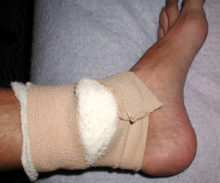 The Red Indians have long used this viscous inner bark to prepare a healing salve, and in herbal medicine a Slippery Elm bark powder is considered one of the best possible poultices for wounds, boils, ulcers, burns and all inflamed surfaces, soothing, healing and reducing pain and inflammation.
The Red Indians have long used this viscous inner bark to prepare a healing salve, and in herbal medicine a Slippery Elm bark powder is considered one of the best possible poultices for wounds, boils, ulcers, burns and all inflamed surfaces, soothing, healing and reducing pain and inflammation.
It is made as follows:
Mix the powdered bark with hot water to form the required consistency, spread smoothly upon soft cotton cloth and apply over the parts affected. It is unfailing in cases of suppurations, abscesses, wounds of all kinds, congestion, eruptions, swollen glands, etc.
In simple inflammation, it may be applied directly over the part affected; to abscesses and old wounds, it should be placed between cloths. If applied to parts of the body where there is hair, the face of the poultice should be smeared with olive oil before applying.
Source: A Modern Herbal
For information on individual herbs visit: The Encyclopedia of Herbology
Marsh Mallow Poultice
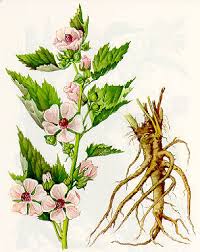 The powdered or crushed fresh roots of the Marsh Mallow make a good poultice that will remove the most obstinate inflammation and prevent mortification. Its efficacy in this direction has earned for it the name of Mortification Root.
The powdered or crushed fresh roots of the Marsh Mallow make a good poultice that will remove the most obstinate inflammation and prevent mortification. Its efficacy in this direction has earned for it the name of Mortification Root.
Slippery Elm may be added with advantage, and the poultice should be applied to the part as hot as can be born and renewed when dry.
An ointment made from Marsh Mallow has also a popular reputation, but it is stated that a poultice made of the fresh root, with the addition of a little white bread, proves more serviceable when applied externally than the ointment.
The fresh leaves, steeped in hot water and applied to the affected parts as poultices, also reduce inflammation, and bruised and rubbed upon any place stung by wasps or bees take away the pain, inflammation and swelling.
Pliny stated that the green leaves, beaten with nitre and applied, drew out thorns and prickles in the flesh.
Source: A Modern Herbal
For information about the individual herbs visit: The Encyclopedia of Herbology
Saida: Salves To Heal Up Wounds
Brenda-Lee: Egg White Cough Cure
Pat Scott: Marsh Mallow Ointment
Sharon from Cleveland, Ohio: Egg White Cough Cure
Vagabond Witch: Soapwort Shampoo
